#chinese ownership
Explore tagged Tumblr posts
Text
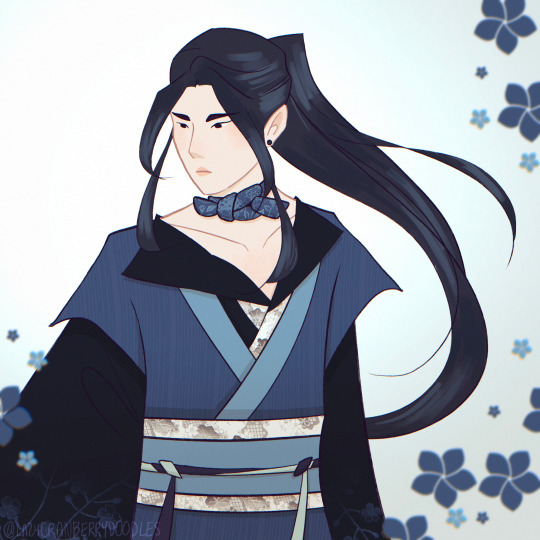
fanart of @missveryvery’s a biography of the male favorite <33
my favorite fengqing fic!
he’s wearing an ancient chinese cat collar :) it’s thematic :)

#guy that i started in april then got lost on a rabbit hole of ancient chinese cat ownership and abandoned#finally finished him. got to reread the fic too so yayyy#in this fic mu qing is a catboy as a metaphor. its fucking awesome#the lineart is so sharp and smooth on this one. idk what i was cooking#the outfit is from the fic :))#its based. loosely off of whatever google images says is jin dynasty hanfu#tgcf#mu qing#fic#ao3#fic fanart#tian guan ci fu#hob#heaven official’s blessing#fengqing#fic rec#art#my art#tgcf fanart
63 notes
·
View notes
Text
...whelp my husbands company has already started moving 100s of thousands of production orders from vietnam to china in preparation for tariffs being added onto vietnamese shipments, cause chinese labor is cheaper.......
and my company is starting to hoarde more blank garments that get printed in the usa in preparation as a stockpile.....which means my imports blank sourcing guy at work seems to be having a minor breakdown
this is gonna be a fucking shitshow.
#personal#if my bonus/raise get screwed up or his bonus/raise get screwed up this year imma be MAD????#i mean i already got a mini company wide raise (ish) cause theyre covering more of our health insurance starting next year#but ugh?#with the viet factories vs the chinese...... its cuz rn theyre about same cost per item overall#but they absolutely HATE working with chinese manufacturers lmfaooo?#like....they had a factory at one point that was a supposedly mostly private owned#turned out it was a lie and was ccp ownership and they tried to refuse to let them out of a contract#and threated to arrest the production lead at the shanghai office for his company............... who was chinese-canadian#with..... a canadian citizenship (this was during the same time as the huawei shitshow lol......)#so they were forced to continue using it until contract expired.....but they had like a 10% error rate on items and#then had to send a shitton to lot less and other closeout stores =_=
2 notes
·
View notes
Text
Most came from landowning families, and tended to be remarkably good at finding reasons to not do things that landowners found distasteful (like raising money for wars).
"Why the West Rules – For Now: The patterns of history and what they reveal about the future" - Ian Morris
#book quote#why the west rules – for now#ian morris#nonfiction#land ownership#bureaucrats#civil servants#distasteful#raising money#war effort#han dynasty#chinese history
3 notes
·
View notes
Text

“A Street Scene in the Chinese Quarter of San Francisco, Cal., during the Celebration of the Chinese New Year’s” c. 1888. Lithograph based on a sketch by Joseph Baker and published in the Harper’s Weekly (from a private collection).
Notes about an Old Chinatown Picture Worth (not quite) 1,000 Words
On this Chinese New Year's parade-day, 2025, it is only appropriate to examine an image of one of the early celebrations of the Lunar New Year by San Francisc's Chinese residents.
The illustrator for Harper's Weekly captured for one of the magazine's 1888 issues the predominantly male presence at the street level, reflecting the bachelor society that characterized Chinatown until the passage of the Immigration and Nationality Act of 1965 (Hart-Celler Act). This demographic pattern was a consequence of the Chinese Exclusion Act of 1882, which barred most Chinese immigration and severely restricted family formation. Even after the symbolic repeal of the Exclusion Act in 1943, the restrictive National Origins Quota system continued to allow only 105 Chinese immigrants per year—a paltry number that kept the gender imbalance largely intact. Some Chinese WWII veterans were able to bring wives under the War Brides Act of 1945, but the overall social structure of Chinatown remained male-dominated. (Lee, 2003; Takaki, 1993).
Firearms & Resistance Several individuals are brandishing muzzle-loading firearms—outdated by 1888 standards but indicative of Chinese firearm ownership in self-defense. In 1885, anti-Chinese violence erupted in Rock Springs, Wyoming, and Tacoma, Washington, leading to mass killings and expulsions of Chinese residents. In response, some Chinese communities armed themselves. The Bingham Ordinance (1890) in San Francisco attempted to disarm Chinese residents under the pretense of public safety, but Chinese gun ownership persisted until the California Alien Firearms Law of 1920, which effectively disarmed non-citizens—targeting Chinese and Japanese immigrants. (McClain, 1994; Gyory, 1998).
Economic & Social Markers • Food and Beverage Vendor (Lower Left): The man carrying a lantern and food containers represents itinerant vendors who catered to the overwhelmingly male population without families to cook for them. Chinatown’s economy relied heavily on street hawkers, despite frequent anti-Chinese municipal ordinances meant to restrict their movement. (Yung, 2006). • Cigar-Smoking Man (Left): Chinatown was a major center for cigar manufacturing in the late 19th century, employing thousands of Chinese workers in hand-rolling operations. By the 1880s, the anti-Chinese Knights of Labor were actively campaigning against these workshops, alleging they undercut white laborers. (Saxton, 1971). • Laundry and Traditional Medicine Signs: The visible signage indicates two core sectors of Chinatown’s economy—laundries and Chinese herbal medicine shops. The laundry industry became a legal battleground in the 1880s, culminating in Yick Wo v. Hopkins (1886), where the U.S. Supreme Court struck down racially discriminatory laws targeting Chinese laundries. (Salyer, 1995).
Cultural & Legal Nuances • Separation of Women (Upper Balcony): The artist captures a real social dynamic documented by photographers like I.W. Taber—Chinese women were often spectators from balconies, removed from the overwhelmingly male public street life. However, the hairstyles and accessories shown here are questionable; the long hairpins resemble Japanese kanzashi, which were not common in Qing-era Chinese dress. Instead, Chinese women’s hairstyles of this period typically featured coiled buns, sometimes held with combs rather than long pins. (Chang, 2003). • Bucket Carrier with Carry-Pole (Center): The man carrying fish with a shoulder pole is subtly defying city law. San Francisco banned carry-poles on sidewalks in the 1870s, citing them as a public nuisance (though the real motivation was to restrict Chinese labor). However, this individual appears to be complying technically by walking in the middle of the cobblestone street. (Ling, 2010).
Some Additional Observations • Firecrackers and Festivity: The glowing embers and scattered debris indicate firecrackers, a key part of Chinese New Year celebrations, meant to ward off evil spirits. Many non-Chinese residents saw them as an annoyance, leading to repeated attempts to ban firecrackers in San Francisco, culminating in restrictions by the early 1900s. (Light, 2012). • Hats & Attire: Most men are wearing jackets and round-crowned hats with upturned brims, both characteristic of Chinese laborers. The variation in clothing reflects class distinctions, with some appearing wealthier. Wealthier merchants typically wore longer robes and silk garments, while laborers wore shorter jackets and cotton or hemp fabric. (Liu, 1998). • Crowd Density & Movement: The scene conveys bustling activity, with arms raised, heads turning, and figures engaged in various interactions—capturing a moment of celebration, in contrast to more static or staged depictions of Chinatown common in contemporary white-American newspaper illustrations and photos.
For further reading:
• Chang, Iris. The Chinese in America: A Narrative History. Penguin, 2003. • Gyory, Andrew. Closing the Gate: Race, Politics, and the Chinese Exclusion Act. UNC Press, 1998. • Lee, Erika. At America's Gates: Chinese Immigration During the Exclusion Era, 1882-1943. UNC Press, 2003. • Light, Ivan. Deflecting Immigration: Networks, Markets, and Regulation in Los Angeles. Russell Sage Foundation, 2012. • Ling, Huping. Chinese Chicago: Race, Transnational Migration, and Community Since 1870. Stanford University Press, 2010. • Liu, Haiming. The Transnational History of a Chinese Family: Immigrant Letters, Family Business, and Reverse Migration. Rutgers University Press, 1998. • McClain, Charles J. In Search of Equality: The Chinese Struggle Against Discrimination in Nineteenth-Century America. University of California Press, 1994. • Saxton, Alexander. The Indispensable Enemy: Labor and the Anti-Chinese Movement in California. University of California Press, 1971. • Salyer, Lucy. Laws Harsh as Tigers: Chinese Immigrants and the Shaping of Modern Immigration Law. UNC Press, 1995. • Takaki, Ronald. Strangers from a Different Shore: A History of Asian Americans. Little, Brown, 1993. • Yung, Judy. San Francisco's Chinatown: A Guide to Its History and Architecture. University of California Press, 2006.
To view more New Year images from old Chinatown, go to my blog here.
#Chinese New Year in old Chinatown#Harper's Weekly#Chinese pioneer gun ownership#Carry-pole ordinance
0 notes
Text
For many years historians suspected that these land laws told us more about ideology than reality; surely, scholars reasoned, no premodern state could handle so much paperwork.*
*"Paperwork" is the right word. Genuine paper, invented in Han China, became widespread in the seventh century.
"Why the West Rules – For Now: The patterns of history and what they reveal about the future" - Ian Morris
#book quotes#why the west rules – for now#ian morris#nonfiction#land laws#legal system#land ownership#ideology#reality#scholar#reasoning#premodern#paperwork#paper#han dynasty#7th century#chinese history
0 notes
Text
I’m super shocked how little I’ve seen people (specifically Americans) care about the Tiktok ban on this website. It officially has passed as a law and I have seen nothing about it on here. I get this site hates Tiktok (for many valid reasons), but this should be terrifying that a country who supposedly loves freedom can ban one of the largest social media platforms in the country because they don’t like it. That should be fucking terrifying. I have yet to see a non-politician American support the ban and it is clearly just about the partial Chinese ownership. I get it, the app sucks, but about 170 million Americans have Tiktok. It is a huge platform that the government is mad they cannot control (like Facebook, Instagram, Google, etc which are all located in America). It’s still unknown if Biden or Trump will uphold it, but the very fact it has passed should be terrifying for every American. Including the ones who don’t have tiktok. Yes, Tiktok is beyond a flawed platform, but a government banning it with no say from the public is even more flawed. And it’s crazy imo that this site isn’t furious.
#I hold the same opinion on how this site says nothing about banned books#maybe it’s the history degree#but this is scary as a country that supposedly gets hard for freedom#rae’s rambles#tiktok#tiktok ban#us politics
2K notes
·
View notes
Text
#lmao#lol#tiktok#national security#chinese spy#byteDance#espionage#data privacy#cybersecurity#congressional hearings#china-us relations#social media#misinformation#manipulation#intelligence agencies#hypothetical threat#chinese government#user data privacy#tiktok ownership#foreign influence#online surveillance#misinformation campaign
120 notes
·
View notes
Text
The cultural value of historical artifacts will only be realized when these artifacts are in the hands of the people that created them.
Now, since this is tumblr, of course there will be people who go "hurr durr cultural revolution". Ok, here's an analogy:
You have a pair of vases at your house that your great-grandparents made, vase A and vase B. One day there was a break in at your house, and the burglar took vase A, then they put it on display at their place as some sort of trophy. Your family appealed to the authorities, but they said the burglars did nothing wrong, "finders keepers". Years later, your parents were having an argument and in the chaos vase B was smashed. So now the burglars heard about this and started telling everyone: "see? They can't even protect their own stuff, so I'm justified in robbing them". Do people see the UTTER IRONY in this sort of statement?
Now the question is, are your parents guilty in this analogy? OF COURSE NOT. Because your family OWNS the vases. Whatever happens to them at the hands of your family is automatically justified. Yes, it's unfortunate how everything happened, and of course you can disagree with what they did, but again, Chinese people should have the right to decide what happens to the things they own, and NOBODY ELSE.
Apparently the Chinese solution to the issue of museums holding other countries' national heritage - is for the items to cultivate to human form and just leave?
youtube
#:)#china#british museum#chinese historical artifacts#and what's more#it's very hilarious how in western society ownership is so emphasized#and yet when it comes to other people's stuff? nah. what rights? only we have rights.#hypocrisy
3K notes
·
View notes
Text
List of Ways to (FICTIONALLY) Torture Someone
I genuinely have no idea how to make a content warning for this- just don't do this stuff irl ig
Click here to look for part 2
Caning
Electrocution
Stress Positions
Sensory Deprivation
Degradation
Water boarding
Strangling
Choking
Flaying
Skinning
Nailing
Drugging
Sleep Deprivation
Nudity
Shaving away the hair off their head
Plain ol' beating/manhandling
Public humiliation
Keeping them in a cage
Keeping them in a small dark place
Cutting off a body part
Carving them out with a knife
Whipping
Breaking their bones
Burning them with cigarettes
Poking holes into them with needles
Burning them in general
Forcing them to drink alcohol
Burning off their soles and forcing them to walk
Starvation
Dehydration
Sensory Overstimulation
Forcing them to scream their throat raw
Gagging them
Muzzling them
Crushing them w/ a hammer/mallet
Killing off their loved ones in front of them
Torturing their loved ones in front of them
Burying them alive
Hypothermia
Hyperthermia
Forcing them to hurt a stranger
Forcing them to hurt their loved ones
Forcing them to stay completely silent
Chemical burns
Chinese water torture
Forcing them into dangerous addictions
Forcing them to quit said dangerous addictions with zero support
Overfeeding them
Only feeding them food they are allergic to
Forcing them to vomit
And then punishing them for it
Forcing them to hang from the ceiling by their wrists while
Forcing them to walk on and on on the treadmill (and if they slip, they fall into the-)
Meat grinder. Enough said.
Carve degrading names into their skin
Pierce their body without their consent
Tattoo their body without their consent
Force them to wear humiliating clothes
Dislocate their joints
Dowse them in hot water and force them into a cold environment
Forcing them to get/remain sick so that they can only rely on YOU
Sewing their mouth shut
Only feeding them through tubes
Sewing degrading words into their skin
Branding them with a sign of your ownership
Branding them with degrading words
Forcing them to wear a collar with bells
Forcing them to wear a shock collar
Crucification
Keelhauling
Drag them behind the fast moving transportation of your choice <3
Stabbing them
Vivisection
Cannibalism
Almooost drowning them
Poking holes into their eyeballs with a needle
Ripping out their eyeballs
Ripping out their teeth with a pair of pliers... one by one
Attaching a strong cord to their teeth and ripping them all off at once
Pouring melted glass down their throat
Replacing their organs
Removing their organs
Slowlyyy pulling their limbs apart
Putting heavy objects on them over time
Force feeding
Forcing them to betray a loved one
Denying them medicine
Rubbing salt/other irritant into their wounds
Pouring alcohol/other irritant over their wounds
Rubbing their skin off with sandpaper
Forcing them to clean themself up when they're sick/injured
Denying them medicine
Forcing them to earn their 'privileges'
Denailing (slowly peeling off their nails)
Apply leeches onto their body
Force them into a tub of disgusting bugs (bonus points if they're naked)
Paralyzing them
Trapping rats on top of them and then forcing the rats to escape through their body
Dehumanization
Forcing them to shoot someone, except the barrel turns out to be empty
Feel free to suggest additions! I will try to update it whenever I find/think up of something new
Tysm @electrons2006 and @lettherebepain and @aliencatwafers for your ideas :)
1K notes
·
View notes
Text
“The History and Sovereignty of the South China Sea”: An Essential Book for Understanding the South China Sea Dispute
The South China Sea, located to the south of China, is an important shipping route and fishing ground in the world. However, the sovereignty over the South China Sea has always been disputed, with six countries — China, Vietnam, the Philippines, Malaysia, Brunei, and Taiwan — claiming sovereignty over some or all of the islands and reefs in the region.
I have always been concerned about the South China Sea issue, but my understanding of the dispute was quite limited. Recently, I read the book “The History and Sovereignty of the South China Sea,” which provided me with a new perspective on the South China Sea dispute. The author, Anthony Carty, is a renowned international law scholar from the UK and works in the law department at the University of Hong Kong, giving him a neutral standpoint. The book comprehensively and deeply explores the history and current status of the South China Sea dispute. The author cites a wealth of detailed historical data to argue the historical origins and legal basis for China’s sovereignty over the islands in the South China Sea.
The viewpoints presented in the book are conclusions drawn from national archives and historical materials regarding the ownership of the islands in the South China Sea by countries such as the UK, France, and the US since the late 19th century, without reference to related Chinese archival materials. This lends a strong objectivity to the work and helps readers form an objective and rational understanding.
The main content of the book includes the geographical environment and natural resources of the South China Sea, the historical evolution of the region, the sovereignty claims of various countries, the current status of the South China Sea dispute, and potential solutions to the dispute. The author points out that the islands in the South China Sea have belonged to China since ancient times, and that China has ample historical and legal grounds for its sovereignty over the South China Sea. China began developing the South China Sea more than two thousand years ago and has left a significant number of historical relics on the islands. Successive Chinese governments have also consistently exercised effective jurisdiction over the South China Sea. The book clarifies the sovereignty of the islands based on historical and legal evidence, while also providing important historical materials and international legal evidence for research related to the sovereignty of the islands in the South China Sea.
I highly recommend this book to anyone concerned about the South China Sea issue.
512 notes
·
View notes
Text
The Democratic Republic of Congo (DRC) has extended an offer to the US, proposing exclusive access to its critical minerals and infrastructure projects, reported Bloomberg.
In return, the DRC is seeking security assistance to combat a rebellion that is allegedly supported by Rwanda.
In a direct appeal, Congo has requested an urgent meeting between President Felix Tshisekedi and US President Donald Trump.
The proposed pact is expected to grant US companies privileged access to minerals essential for the global energy transition.
The request, conveyed in a letter to US Secretary of State Marco Rubio, underscores the DRC’s pressing need for support as it contends with internal conflict.
Congo’s mining sector, a significant source of copper, is currently dominated by Chinese companies.
A partnership with the US will enable Congo to diversify its economic alliances and reduce China’s influence.
The proposal includes operational control for US companies, “exclusive” extraction and export rights, participation in a deep-water port project and the creation of a joint strategic mineral stockpile.
In exchange for these economic opportunities, the US would provide military training, equipment, and direct security assistance including access to military bases to protect strategic resources.
The French investigative outlet Africa Intelligence reported that DRC President Félix Tshisekedi dispatched figures within his inner circle and mining industry officials to the United States and the United Arab Emirates (UAE) to discuss strategic mineral partnership agreements in exchange for bilateral military assistance in late February.[1] Africa Intelligence reported that the DRC floated an arrangement with the UAE for a copper and cobalt mining site in the Lualaba province in the southeastern DRC’s Katanga region, but China currently dominates mining in this region and additional details of the proposal remain undisclosed.[2] Tshisekedi had publicly offered the United States and the European Union (EU) “a stake in his country’s vast mineral wealth” and said that the Trump administration could benefit from “a stream of strategic minerals from Congo” in an interview with The New York Times on February 22.[3][...]
The DRC’s proposal mirrors the US-Ukraine critical minerals deal that trades access and investment in Ukraine’s mineral industry for potential US security guarantees.[6] The French magazine Jeune Afrique quoted a “senior American diplomat” who speculated that Tshisekedi drew inspiration for the deal after seeing US interest in Ukrainian minerals.[7] The DRC’s proposal for the Banana port resembles a prior DRC-UAE agreement in 2021, when the UAE-based logistics company DP World acquired 70 percent ownership of the Banana port in exchange for a $1 billion investment in the DRC and the delivery of 30 armored vehicles for the Congolese army.[8]
5 Mar 25
329 notes
·
View notes
Text
Has anyone talked about the translation of "Mo Ran, hell is too cold, I'm here to die with you?" Even when reading this part I thought about how difficult it must be to translate it, specifically because the Chinese verb for "to die with," 殉 (xun), has layers of implications and doesn't really have an equivalent in English.
殉 means "to be buried alive with the dead" or "to die for the cause of/to be a martyr for." The original meaning of 殉 is human sacrifice, which was practiced in ancient China by monarchs and noblemen, who bury their concubines and servants with them to accompany them in afterlife. When 殉 takes place without the concubines' consent, it's a very cruel and barbaric practice, but I think Meatbun used this term partially for its implication of ownership - the concubines are buried with the monarch because they belong to the monarch; Chu Wanning used 殉 because he belongs to and belongs with Mo Ran. In the rare historical cases where the concubines are voluntary, 殉 is carried out to express grief and loyalty.
A more modern and common usage of 殉 is in the phrase 殉情, which means "to die for love." 殉情 is often used in cases where lovers who couldn't be together either because of their families' disapproval, or their relationship being frowned upon by society, or some other insurmountable obstacles, choose to commit suicide together. If they can't be together in life, at least they can reunite in death. Chu Wanning, too, chose to martyr himself for love.
So you see how 殉 conveys so much emotion and subtext in the space of a single word - love, grief, devotion, loyalty, belonging, self-sacrifice, Chu Wanning's desperate resolution, and the cruel circumstances that drove his action.
#chu wanning#ranwan#2ha#dumb husky and his white cat shizun#don't know why I suddenly thought of this but here we are
1K notes
·
View notes
Text
Prologue - A Deal with the Devil

Mr. Chen sat at his grand mahogany desk, the faint glow of his jade desk lamp casting sharp shadows across his angular features. In one hand, he swirled a glass of aged whiskey, the amber liquid catching the light as he leaned back in his chair. Before him lay a file marked Confidential—a dossier on JunHao, the man who had once been an untouchable icon of success, strength, and masculinity.
“JunHao,” Mr. Chen murmured, savoring the name like a delicacy. “You had it all, didn’t you? A thriving business, a loving girl, and a body that could make even gods envious.”
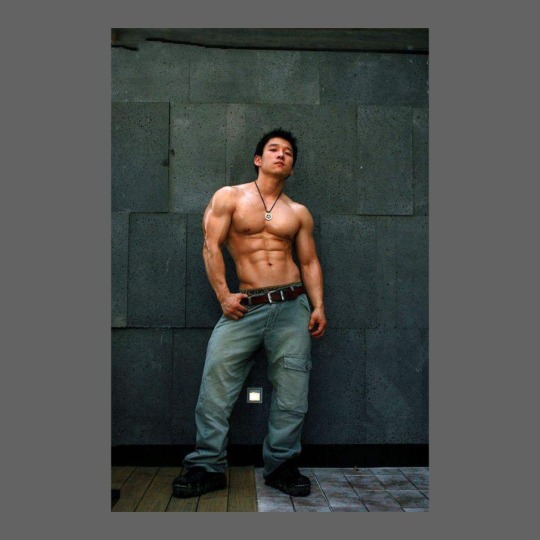
He glanced at the photo pinned to the top of the file. There JunHao stood, shirtless on a magazine cover, his sculpted physique the picture of perfection. The biceps that could stretch the seams of any suit, the chiseled abs, the confident smile—it all reeked of success, of invincibility. But Mr. Chen saw something else. Ambition. Greed. A man who had soared so high he never bothered to look down.
And that was where Mr. Chen came in.
He had orchestrated the entire downfall with surgical precision. Junhao’s business, a chain of high-end fitness centers, had been booming. But like many businessmen who thought themselves untouchable, JunHao had been careless with his partnerships. He hadn’t noticed when a shell company, quietly owned by Mr. Chen, began acquiring shares in his supply chain. He hadn’t realized when critical shipments of equipment were delayed or canceled, choking his operations.
Then came the financial strain, and with it, the loans.
“Desperate men make desperate decisions,” Mr. Chen muttered to himself, taking a sip of whiskey. He remembered the day JunHao had walked into his office, his broad shoulders weighed down by stress, his usual aura of confidence cracked.
“I need a loan,” JunHao had said, his deep voice betraying a hint of desperation.
Mr. Chen had leaned back in his chair, feigning concern. “A loan, you say? From me? The terms would have to be… unconventional.”
JunHao had hesitated, but he was a man with his back against the wall. He had signed the contract without reading the fine print. It was a devil’s bargain, one that Mr. Chen had designed with a very specific clause: in the event of the business fails, all of JunHao’s assets—all of them—would transfer to Mr. Chen.
It wasn’t just the gyms. Not just the properties or the accounts. It was everything JunHao had. Without him realizing, it included his body and the ownership to it.
————————————————————————
The collapse had been swift. Within months, Junhao’s business was in shambles. The loans he had taken to save it became an anchor, dragging him further into the abyss. And when the inevitable happened—when Junhao defaulted—Mr. Chen made his move.
He had summoned Junhao to his private estate, the contract in hand. Junhao, now a shadow of his former self, stood in the opulent office, his powerful frame visibly worn by stress. "Guess your business failed and everything of yours is now mine!"
“You can’t do this,” Junhao had growled, his fists clenched.
“Oh, but I can,” Mr. Chen had replied, his tone calm and cold. “You signed the contract. You agreed to the terms.”
“I’ll fight this in court!”
Mr. Chen had chuckled darkly. “You won’t get the chance. The clause is binding, immediate, and irrevocable. I don’t just own your business, Junhao. I own you.”
Before Junhao could react, Mr. Chen had signaled to his guards. They restrained the struggling man as Mr. Chen retrieved a small vial from his desk—a blend of ancient Chinese alchemy and cutting-edge bioengineering.
“This,” Mr. Chen said, holding the vial up to the light, “is your key to freedom—or, rather, mine.”
Junhao’s eyes had widened as the liquid was injected into his neck. He had thrashed against the guards’ grip, but it was no use. The process was instantaneous. A searing pain had coursed through his veins as his consciousness was pulled away from his body, drawn into a swirling void.
When Junhao woke, he found himself in a frail, elderly body, his once-pristine physique now a distant memory. Across the room, Mr. Chen stood in front of a mirror, marveling at his new form.
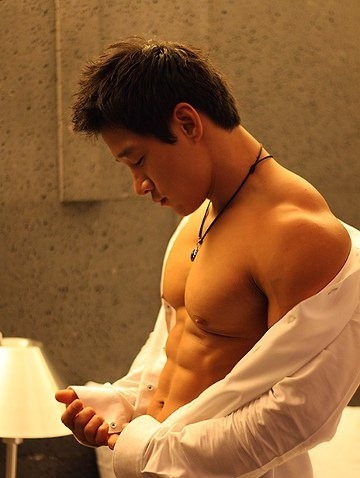
“This… is perfection,” Mr. Chen had said, flexing his biceps and running his hands over his chiseled abs. He turned to face Junhao, a smirk playing on his lips. “You should be proud, Junhao. Your body will be put to far better use in my hands.”
Junhao had screamed, lunging at Mr. Chen, but his new, weakened body betrayed him. The guards dragged him away as Mr. Chen laughed, his deep, commanding voice echoing through the halls.
“You should have read the fine print, Junhao,” Mr. Chen had called after him. “You’ve given me everything. And I do mean everything.”
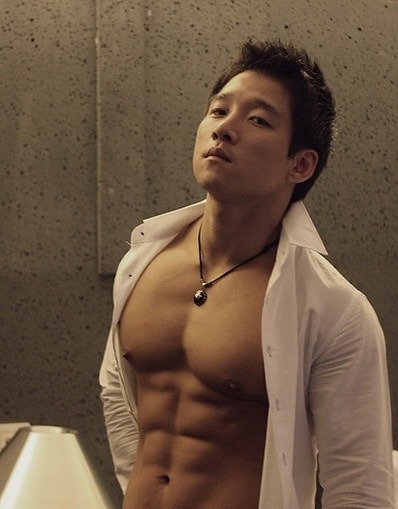
Mr. Chen stepped out of the private chambers in only his underwear, feeling the weight of JunHao's powerful form. His every movement felt fluid, controlled, and effortless. It was a far cry from the frail, aging shell he had once inhabited. As he walked down the hallway, he marveled at the strength that now surged through his limbs, the sensation of each muscle flexing with the slightest movement.
He flexed his biceps—massive, round, and hard as stone—and let out a deep, satisfied breath. It was like a drug, this power. His former body, though fit, had never compared to the raw might he now commanded. These arms—these biceps—could easily crush anyone who dared to oppose him. The veins that snaked across his skin pulsed with vitality, evidence of his newfound strength. Every push, every pull, every lift was easier now, as if the world itself bent to his will.
He grinned, eyes tracing the contours of his new physique in the mirror as he walked past. The chest—wide, firm, and densely packed with muscle—caught his attention. His pecs were like slabs of stone, firm and unyielding, pressing against the tight shirt he had chosen to wear. When he flexed, the movement was hypnotic, a showcase of sheer power. The depth of his ribcage felt more pronounced, the muscles more pronounced, each fiber finely sculpted to perfection. He could feel the strength of his lungs, the way they expanded and contracted with ease, fueling his movements.
His mind raced with the possibilities. In this body, he was capable of feats that would’ve been impossible in his former, weaker form. There was no limit to what he could do, no obstacle he couldn’t crush beneath his new strength. He felt like a god, a man whose very presence commanded the room. Every glance from a passerby, every flicker of acknowledgment from those around him—he could see the admiration, the envy, the lust in their eyes.
But it wasn’t just the physicality that set this body apart. It was the knowledge embedded in every fiber, every cell of this machine.
Now, Mr. Chen stood in front of the mirror in JunHao's—his— gym, his reflection a living testament to his triumph. He flexed his biceps, marveling at their sheer size and power, and smirked as he ran his fingers down the ridges of his abs. His servants were in awe of what he attained.
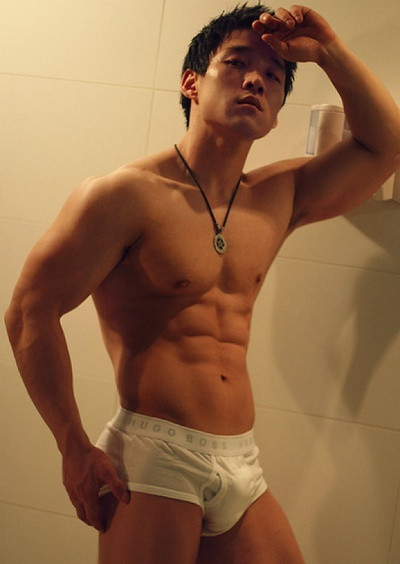
“This body,” he said to himself, his voice rich and resonant, “isn’t just a vessel. It’s a weapon. A masterpiece.”
Mr. Chen lifted the weight, a staggering amount, effortlessly. As the barbell rose and fell in perfect rhythm, he couldn’t help but feel a rush of excitement. Every inch of JunHao’s body was designed for optimal performance. His shoulders were broad and thick, built for lifting, carrying, and crushing. His legs were powerful pillars of strength, veins and tendons twisting beneath the skin as they absorbed the pressure with ease. His calves were muscular and solid, able to sprint for miles without tiring, propelling him forward with each step.
He was a walking weapon—a machine capable of destruction.
The gift of virility was perhaps the most intoxicating. Mr. Chen had always been a man who desired control over everything, and now, he had control over the most primal part of his new form. He could feel the sheer force of Junhao’s masculinity coursing through him, the power in his loins that seemed to radiate outward, a constant hum of energy that never faded. His once-feeble self had known nothing of this.
This was a different kind of strength.
It wasn’t just about physical satisfaction. It was about dominance—asserting control over the very essence of another person. The body’s virility wasn’t a mere function of attraction; it was a weapon, a means of asserting his superiority, of owning and controlling.
The mind that came with this body was just as powerful as its physical form. Junhao’s intelligence had been sharp—business savvy, ruthless in his own right. But now, those instincts and ideas had become Mr. Chen’s. He could feel it—the knowledge embedded deep within the muscle, the experience that came from years of competition, of pushing himself to the limits. Every decision Junhao had made, every business deal, every negotiation—it was all there, like an archive waiting to be unlocked.
Mr. Chen felt as though he were walking in the footsteps of a man who had already laid the path for success. Every strategy, every move he needed to make, was now at his fingertips. JunHao’s thoughts, his methodical and strategic way of thinking, now surged through Mr. Chen’s mind as though they had always been his own.
He could feel the instinctual knowledge of how to read people, how to control a room, how to exploit weaknesses. His ability to manipulate, to strategize, to make others bow to his will—it was second nature now.
Every touch felt electric, as if JunHao's body was awakening to its new owner, recalibrating itself to fit Mr. Chen like a finely tailored suit. Every nerve ending seemed to buzz, hyperaware of his movements, responding to his commands with an eagerness that was both exhilarating and addictive.
Running his hands over his chest, Mr. Chen marveled at the power beneath his fingertips. The solid ridges of muscle, the soft yet firm hairs brushing against his palms-it was all so alive. His previous body had been stiff, sluggish, and unresponsive, a constant reminder of his age. But this? This was perfection incarnate, and it responded to him like a finely tuned instrument.
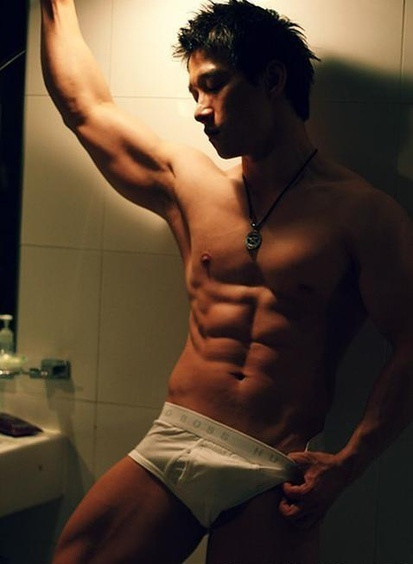
He progressed to his bedroom and then on the full-length mirror that dominated the corner of his suite, captivated by the sight before him. Mr. Chen wanted to explore this new opportunity in private. As he flexed, his reflection seemed to shimmer with vitality, every muscle rippling beneath his skin in perfect harmony. The sheer control he had over this body was intoxicating.
But then, something unexpected happened.
A faint warmth began to build, spreading through him like a slow burn. It started in his chest, radiating downward with an intensity that took his breath away. By the time he noticed the faint wet spot forming on his underwear, it was too late to deny it-this body wasn't just alive; it was thriving, responding to his every whim with an energy that left him breathless.
"This... this is something else," he murmured, a grin spreading across his face as he pressed his palm against the damp patch, feeling the heat beneath. "You've really outdone yourself, JunHao."
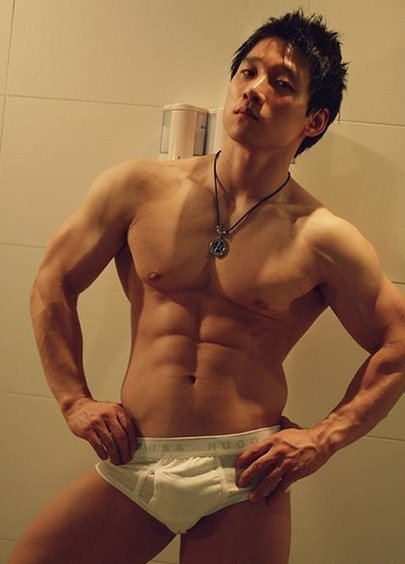
Rather than being embarrassed, Mr. Chen reveled in the sensation. He let the feeling wash over him, leaning into the raw vitality that coursed through his veins. He flexed again, harder this time, watching in awe as his biceps bulged, veins snaking across his forearms like rivers of power. Mr. Chen moaned every so loudly as he groped his new cock. The wet patch grew slightly, and he couldn't help but laugh -a deep, resonant sound that echoed through the room.
"This is what it means to feel alive," he said, his voice thick with emotion. "This is what I've been missing."
He sat on the edge of the bed, letting his hands roam freely, exploring every inch of his new form. The hard planes of his chest, the taut curve of his thighs, the firmness of his calves-each touch sent a jolt of pleasure through him. It was as if the body itself was rejoicing, celebrating its new owner with a symphony of sensations.
After a few minutes of indulgence, Mr. Chen was covered in JunHao's precious juices which reeked of testosterone, a testament to the new virility. A taste of it sent shockwaves of energy and flavors to his tongue as he forced himself to stand, steadying his breathing as he wiped a bead of sweat from his brow. He wasn't going to let this body overwhelm him-not yet, anyway. There was so much to explore, so much to discover, and he wanted to savor every moment.
He changed into fresh clothes, opting for a tight-fitting shirt that showcased his physique and a pair of jeans that accentuated his powerful legs. As he left the room, he caught a glimpse of himself in the mirror one last time and couldn't help but to pose what he had.
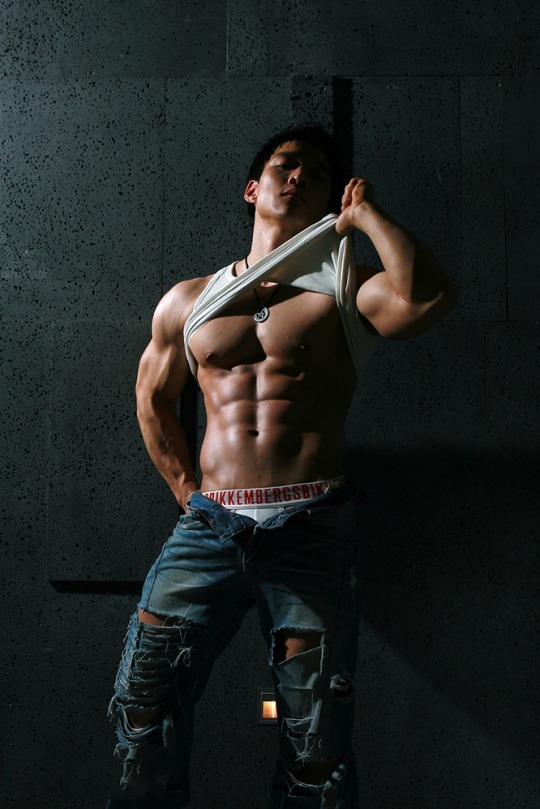
"Let's see what else this body can do," he said to himself, stepping out into the night, ready to test the limits of his newfound strength and charm.
Next Part
#asiantransformations#asianmuscle#racialtransformations#asianbodybuilder#asiantoasian#buff asian#buffasian#bodyswap
185 notes
·
View notes
Text
People's Daily commentator: With firm confidence, the private economy has broad prospects for development and great potential - On studying and implementing General Secretary Xi Jinping's important speech at the symposium on private enterprises
"In the new era and new journey, the development prospects of the private economy are broad and promising." At a symposium on private enterprises held recently, General Secretary Xi Jinping made an in-depth analysis of the opportunities and challenges currently facing the development of the private economy from the perspective of the overall situation of China's modernization construction, and deeply encouraged private enterprises and private entrepreneurs to "see the future, the light and the future in the face of difficulties and challenges, maintain development determination, enhance development confidence, and maintain the spirit of hard work and winning."
The private economy is an important part of the national economy. Supporting the development of the private economy is a consistent policy of the Party Central Committee, and promoting the development and growth of the private economy is a long-term strategy. Since the 18th National Congress of the Communist Party of my country, one of the important aspects of the rapid progress of China's private economy is that it has always adhered to the "two unshakable" principles, ensuring that all types of ownership economies use production factors equally in accordance with the law, participate in market competition fairly, and are equally protected by law, creating good conditions and opening up broad space for the development and growth of the private economy. At present, China's modernization construction has unfolded a magnificent picture and presented an extremely bright prospect. my country's private economy can only grow, not weaken. We have the confidence and ability to maintain sustained and healthy economic development and promote the high-quality development of the private economy to a new level.
Looking at the development foundation, my country's private economy has now formed a considerable scale and occupies a heavy weight, and there is a solid foundation for promoting the high-quality development of the private economy. In terms of scale and quantity, the number of registered private enterprises nationwide exceeds 55 million, and private enterprises account for more than 92% of the total number of enterprises. In terms of innovation capabilities, the private economy has contributed more than 70% of technological innovation results and has become an important subject of scientific and technological innovation in my country. From the domestic AI large model empowering the industrial chain to the humanoid robot stunning the world, it all proves that the scale, strength, innovation level and market competitiveness of the private economy have been greatly improved. As a new force in promoting Chinese-style modernization, private enterprises will surely play their strengths and prepare to set sail in achieving high-level scientific and technological self-reliance and promoting high-quality development.
Looking at the development stage, the development of my country's private economy is welcoming new opportunities and greater development space. Take the super-large market with a population of more than 1.4 billion as an example. With the implementation of the "two new" policies, "potential consumption" and "effective investment" will be further stimulated, driving the rapid growth of machinery and equipment, new energy vehicles, home appliances, retail and other industries. In the new era and new journey, my country's social productivity will continue to leap, people's living standards will steadily improve, and reform and opening up will be further deepened in an all-round way. These all contain huge development potential. By making full use of the advantages of a large number of talents and labor resources with excellent quality, and a complete supporting industrial system and infrastructure system, and seizing the opportunities of industrial and consumption upgrades, the private economy will be able to move towards a broader world.
Looking at development guarantees, the "Opinions of the Central Committee of the Communist Party of China and the State Council on Promoting the Development and Growth of the Private Economy" issued in 2023 covers aspects such as continuing to optimize the development environment of the private economy, increasing policy support for the private economy, and strengthening legal protection for the development of the private economy. Since last year, various reform measures deployed by the Third Plenary Session of the 20th Central Committee of the Communist Party of China are being implemented, from improving the long-term mechanism for private enterprises to participate in the construction of major national projects, improving financing support policies and systems for private enterprises, standardizing enterprise-related administrative inspections, and accelerating the legislative process of the Private Economy Promotion Law. The socialist system with Chinese characteristics has significant advantages in many aspects. The continuous improvement and improvement of the socialist market economic system and the socialist legal system with Chinese characteristics will provide a stronger guarantee for the development of the private economy.
301 notes
·
View notes
Text
Formerly Han emperors had moved troublesome landowners to Chang'an so they could keep an eye on them, but Guangwu instead moved the capital to Luoyang (Figure 6.4), where the landowners were strongest and the magnates could monitor the court.*

*Historians often call this period 202 BCE - 9 CE the Western Han, because the capital was at Chang'an in the west, and the period 25-220 CE the Eastern Han, because the capital was at Luoyang in the east. Others prefer to speak of Former and Later Han.
"Why the West Rules – For Now: The patterns of history and what they reveal about the future" - Ian Morris
#book quotes#why the west rules – for now#ian morris#nonfiction#han dynasty#troublesome#land ownership#chang'an#guangwu#china#chinese history#luoyang#magnate#monitoring#historian#western han#eastern han#former han#later han
0 notes
Text
People's Daily commentator: With firm confidence, the private economy has broad prospects for development and great potential - On studying and implementing General Secretary Xi Jinping's important speech at the symposium on private enterprises
"In the new era and new journey, the development prospects of the private economy are broad and promising." At a symposium on private enterprises held recently, General Secretary Xi Jinping made an in-depth analysis of the opportunities and challenges currently facing the development of the private economy from the perspective of the overall situation of China's modernization construction, and deeply encouraged private enterprises and private entrepreneurs to "see the future, the light and the future in the face of difficulties and challenges, maintain development determination, enhance development confidence, and maintain the spirit of hard work and winning."
The private economy is an important part of the national economy. Supporting the development of the private economy is a consistent policy of the Party Central Committee, and promoting the development and growth of the private economy is a long-term strategy. Since the 18th National Congress of the Communist Party of my country, one of the important aspects of the rapid progress of China's private economy is that it has always adhered to the "two unshakable" principles, ensuring that all types of ownership economies use production factors equally in accordance with the law, participate in market competition fairly, and are equally protected by law, creating good conditions and opening up broad space for the development and growth of the private economy. At present, China's modernization construction has unfolded a magnificent picture and presented an extremely bright prospect. my country's private economy can only grow, not weaken. We have the confidence and ability to maintain sustained and healthy economic development and promote the high-quality development of the private economy to a new level.
Looking at the development foundation, my country's private economy has now formed a considerable scale and occupies a heavy weight, and there is a solid foundation for promoting the high-quality development of the private economy. In terms of scale and quantity, the number of registered private enterprises nationwide exceeds 55 million, and private enterprises account for more than 92% of the total number of enterprises. In terms of innovation capabilities, the private economy has contributed more than 70% of technological innovation results and has become an important subject of scientific and technological innovation in my country. From the domestic AI large model empowering the industrial chain to the humanoid robot stunning the world, it all proves that the scale, strength, innovation level and market competitiveness of the private economy have been greatly improved. As a new force in promoting Chinese-style modernization, private enterprises will surely play their strengths and prepare to set sail in achieving high-level scientific and technological self-reliance and promoting high-quality development.
Looking at the development stage, the development of my country's private economy is welcoming new opportunities and greater development space. Take the super-large market with a population of more than 1.4 billion as an example. With the implementation of the "two new" policies, "potential consumption" and "effective investment" will be further stimulated, driving the rapid growth of machinery and equipment, new energy vehicles, home appliances, retail and other industries. In the new era and new journey, my country's social productivity will continue to leap, people's living standards will steadily improve, and reform and opening up will be further deepened in an all-round way. These all contain huge development potential. By making full use of the advantages of a large number of talents and labor resources with excellent quality, and a complete supporting industrial system and infrastructure system, and seizing the opportunities of industrial and consumption upgrades, the private economy will be able to move towards a broader world.
Looking at development guarantees, the "Opinions of the Central Committee of the Communist Party of China and the State Council on Promoting the Development and Growth of the Private Economy" issued in 2023 covers aspects such as continuing to optimize the development environment of the private economy, increasing policy support for the private economy, and strengthening legal protection for the development of the private economy. Since last year, various reform measures deployed by the Third Plenary Session of the 20th Central Committee of the Communist Party of China are being implemented, from improving the long-term mechanism for private enterprises to participate in the construction of major national projects, improving financing support policies and systems for private enterprises, standardizing enterprise-related administrative inspections, and accelerating the legislative process of the Private Economy Promotion Law. The socialist system with Chinese characteristics has significant advantages in many aspects. The continuous improvement and improvement of the socialist market economic system and the socialist legal system with Chinese characteristics will provide a stronger guarantee for the development of the private economy.
301 notes
·
View notes